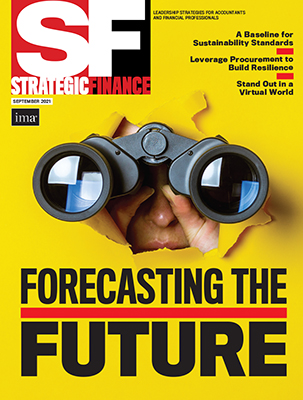The necessary ingredients for fraud—pressure, opportunity, and rationalization—are abundant in the aftermath of any crisis. Fraud is contextual, and every crisis also has its own unique recipe for fraud. During the tech bubble in the late 1990s, companies devised strategies to inflate revenues to meet expectations of aggressive growth, while the subprime mortgage crisis of 2007-2010 saw an uptick in identity theft for purposes of obtaining a mortgage. Fraudsters posing as charities present an ongoing risk, as with the western U.S. wildfire frauds.
After more than a year and a half of the COVID-19 pandemic, tax preparers are encountering several fraudulent schemes. Some are new; others are old, but with a twist. The spike in unemployment, coupled with stimulus checks and increased unemployment benefits, has increased the potential payoff for fraudulent claims and identity theft. Paycheck Protection Program (PPP) loans and the new employee retention credit (ERC) also increase the payoff for tax frauds. And the sudden shift to remote work introduced system vulnerabilities for companies and employees.
Taken together, the number of opportunities for fraud are greater, the potential gain is much higher, and the pressure to commit fraud is palpable. Tax preparers are often among the first to discover that a taxpayer has been a victim of these crimes.
IDENTITY THEFT
Motivated by bonus payments of up to $600, fraudsters are using stolen identities to apply for and obtain unemployment benefits in (sometimes multiple) states in which they don’t live. Recent reports suggest that there’s even a black market where jobless benefits can be purchased or sold. (See “Fraud Schemes Exploit Weak Spots in Unemployment Claims System,” The New York Times, October 1, 2020.)
Taxpayers typically discover they’ve been a victim of this type of identity theft when they receive a Form 1099-G, Certain Government Payments, from states in which they don’t live. Alternatively, documentation like Form 1095-C, Employer-Provided Health Insurance Offer and Coverage, showing that a taxpayer was employed for the entire year, may contradict payments appearing on Form 1099-G.
Because it’s ultimately the state that was defrauded, taxpayers or their preparers should report the fraud to the state issuing Form 1099-G, requesting that the form be reissued as “corrected” with a zero amount. The Internal Revenue Service (IRS) provides information on how to reach those states on its website and recommends that identity theft be reported to the Federal Trade Commission and the U.S. Department of Justice’s National Center for Disaster Fraud.
Tax preparers can advise identity theft victims on other steps they can take to protect themselves. At a minimum, individuals should check with the Social Security Administration and review a recent credit report for signs that their identity has been compromised. They should also file a police report to check for crimes that may have been committed under their stolen identity and obtain an Identity Protection PIN through the IRS for future tax years.
PPP LOANS
Tax preparers have also seen fraudulent PPP loan applications and inappropriate use of funds received. Following the subprime mortgage crisis, programs such as the Troubled Asset Relief Program (TARP) garnered public criticism for fraud, waste, and abuse. In response, the government began to monitor the allocation of TARP funds, recovering more than $157 million in 2020 alone.
Going forward, we might expect similar governmental oversight of PPP loans. That is, PPP loan recipients will likely face continued scrutiny regarding their eligibility for the program and use of the funds. While tax preparers are allowed to rely on client representations in preparing taxes, they should exercise caution and carefully document evidence of client eligibility for and proper use of PPP funds.
Tax preparers may also be asked to assist in the filing of PPP applications. If the client chooses to apply for loan forgiveness, preparers will ultimately bear some responsibility for accurately accounting for the tax treatment of the loan. Because they’re prohibited from collecting fees from clients for preparing a PPP application on their behalf, any fees for acting as an official application agent should be paid from the fee received by the lender processing the loan.
Another form of payroll support available under the Coronavirus Aid, Relief, and Economic Security Act is the ERC. This credit is refundable and is calculated as 50% of wages paid to employees (up to $10,000). But an opportunity for inappropriate double-dipping exists when wages are paid with PPP loan proceeds. Here, documentation is key. Tax preparers should carefully separate wages covered by a PPP loan from wages qualifying for the ERC.
REMOTE WORK
Perhaps the most notable and potentially longest-lasting change to come from the COVID-19 crisis is the reconfiguration of the traditional workplace. A massive shift to remote work has been accompanied by a massive increase in cybersecurity risk.
Previously secure communications are now occurring on unsecured home networks and personal devices, often within earshot of smart home devices and neighbors, and sensitive documents pile up in home offices. A recent survey by Deloitte reports that cybercriminals are keen to exploit these weaknesses and companies are scrambling to protect remote workers from external attacks.
Additionally, the Federal Bureau of Investigation has warned of an increase in fake emails and phishing attempts appearing to come from legitimate organizations (such as the Centers for Disease Control and Prevention), as well as an increased risk of cyberattacks on video conferences.
To mitigate these risks, companies will need to ramp up employee training, improve system controls, and implement continuous monitoring measures that are appropriate for the workplace of the future. There may be an opportunity for accountants to draw on existing expertise related to internal controls and business systems to provide additional services to clients interested in protecting themselves and their assets, or they can consider partnering with companies that offer such services.
Fraud risks brought on by COVID-19 will likely persist for many years to come. While some fraudulent schemes can be anticipated, others have yet to reveal themselves. For tax preparers, due diligence is paramount.
© 2021 A.P. Curatola

September 2021



